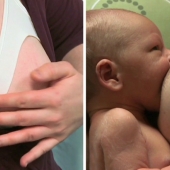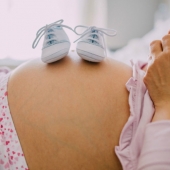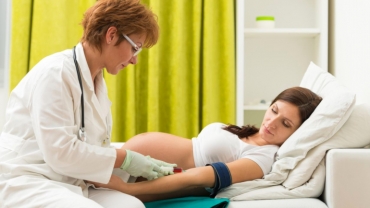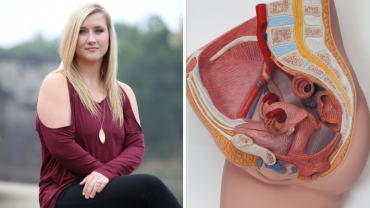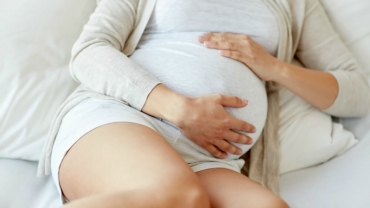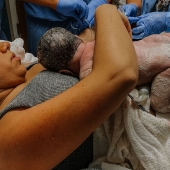The recovery time that follows the birth of your baby is called postpartum and means “after birth.” Postpartum is a special time, as you get to know your baby. But it is also a time of adjustment; you may still feel some pain from giving birth.
As you recover at home with your baby, there are many ways for you to care for yourself as you continue to heal during this postpartum period.
You may feel what is sometimes called “afterbirth pain”, when your uterus contracts off and on. To ease any discomfort, you may gently massage your lower abdomen, lie face down with a pillow under your stomach, or use a heating pad. Relaxation breathing techniques – which you learned in chapter one – are also a good way to relax and create comfort.
If you had an episiotomy in the hospital, your stitches will dissolve without having to be removed. If your vaginal area feels tender, a warm bath usually helps. Also, use a squirt bottle to rinse the area with warm water when you use the bathroom. Rinse from front to back, and pat bathroom tissue in the same direction. Do not wipe.
You may have hemorrhoids, which will shrink in two to four weeks. Ice packs or cold gels – wrapped in a clean towel – usually help ease discomfort. Talk to your health care provider before using any over-the-counter creams. If your hemorrhoids are still painful at your postpartum checkup, your health care team can recommend other treatment options.
New mothers often feel some pain in their breasts during the postpartum period, including sore nipples. Keeping your breasts dry, changing your breast pads often, and applying non-petroleum and non-alcohol ointment to your nipples usually helps.
Your breasts may also become engorged – swelling with extra fluid. To help ease the discomfort of engorgement, feed your baby often – eight to twelve times every twenty-four hours. You may also want to gently massage your breasts before and during feedings. Try different nursing positions that make you comfortable. And let your baby drain the first breast before offering the second breast.
Your breasts may become engorged even if you are formula feeding. If so, hand express or pump milk for relief, which you can also do if you are breast feeding.
Breastfeeding should not hurt. You should call your Lactation Support Resources if you have pain in your breasts that won’t go away after your baby starts feeding; your nipples are cracked, blistered, red, or bleeding; you are unsure if your baby is feeding effectively, or if your breasts are not draining enough.
It is also common to be constipated after giving birth, especially if you are taking pain medicine. Make sure you follow the directions in your After Visit Summary about what to eat and drink. Talk to your health care provider before using any stool softener or laxative.
Caring for your baby around the clock is tiring. Because your baby will usually only sleep for two or three hours at a time, you may become exhausted. It is very important to try to sleep whenever your baby does. Ask your partner or a family member to care for your baby if you need to sleep.
If you do not feel sleepy, try a warm bath or some of the relaxation techniques you learned about in chapter one, such as breathing exercises or guided imagery.
More than half of all new mothers feel depressed after giving birth, usually within three or four days. There are a number of reasons for this, including lack of sleep, feeling overwhelmed, and hormonal changes in your body.
You may feel sad, anxious, or have trouble sleeping or eating. You may have low energy and feel like doing nothing – followed by periods of high energy where you are overly excited and want to do too much.
Although these feelings may be scary at times, just remember that postpartum depression is common, and that it eventually goes away. It is important to get enough rest if you are too anxious, and to try to move your body if you feel tired much of the time.
Talking about your feelings with your partner, family member, or a close friend is very helpful during this time.
It is also very helpful to use some of the alternative therapies you learned about in chapter one. Aromatherapy, guided imagery, massage, and other mind-body skills are excellent ways to help you feel grounded, so you can continue to care for your baby and yourself.
If your feelings of depression seem to be too overwhelming and will not go away, call your health care provider. Help is always available.
During your postpartum recovery at home, it is very important to keep all your follow-up appointments with your health care team – who can address any questions or concerns you may have about how to care for yourself and your baby as you recover at home.
- 5546 views

